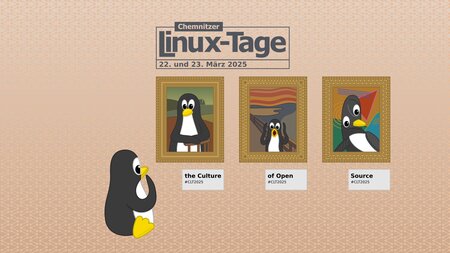Informatik-Kolloquien
305. Informatik-Kolloquium
Hochschulöffentliche Vorträge
Mittwoch, 11.12.2019, Straße der Nationen 62, Böttcher-Bau, 1/336 (neu: A12.336)
Herr Prof. Axel Ngonga
Lehrvortrag: "Relationale Algebra - Eine Einführung"
Relationale Algebren bilden die formale Grundlage für das Anfragen von relationalen Datenbanken. In dieser Lehrprobe werden die Grundlagen einer relationalen Algebra mit Mengensemantik vermittelt. Besonders hervorgehoben werden ausgewählte Grundoperatoren, ihre Syntax und ihre Semantik. Zusätzlich werden mögliche Nutzungsszenarien der vorgestellten Operatoren mittels einfacher Relationen erläutert. Das Hauptlernziel der Veranstaltung ist, dass die teilnehmenden Studierende die Semantik sowie mögliche Einsatzzwecke der vorgestellten Operatoren verstehen. Vorausgesetzt wird Fachwissen aus den ersten 4 Semestern des Informatik-Bachelor-Studiengangs.
Forschungsvortrag: "The Quest for Knowledge"
With humans' increasing need for information come increased requirements pertaining to the scalability and versatility of data management. In this talk, I give a brief overview of a stack of solutions I (co)-developed to address central data management challenges using RDF knowledge graphs. The talk begins with a brief introduction, which motivates the need for more intelligent data management solutions. The rest of the talk focuses on scalable solutions ranging from the extraction of knowledge from large-scale data to its use in various domains of application. Highlights of the talk include novel results pertaining to tensor algebra for storing RDF knowledge graphs as well as corroboration-based fact checking for improved veracity.
12.45 Uhr
Herr Dr. Michael Martin
Lehrvortrag: "Relationale Algebra"
Forschungsvortrag: "Linked (Open Data) Services for Enterprises, Government and Sciences"
In the age of digitization, existing as well as new data and services are permanently made available on the web to the public as well as to closed user groups. Providing data and services publicly is often useful in terms of economic (i.e. quality, time efficiency) and environmental criteria. However, finding these data and services on the web, evaluating their usefulness, extracting useful parts, testing their potential use, and linking and integrating each other can quickly become very complex. The use of semantically represented metadata as well as common vocabularies to describe data and services has positive effects for providers and users. This presentation outlines selected aspects of obtaining, designing, and using metadata, as well as research projects that have examined Linked (Open) Data paradigms in enterprises, government, and sciences.
(deutsch)
Im Zeitalter der Digitalisierung werden permanent bestehende sowie neue Daten und Dienstleistungen öffentlich im Web aber auch geschlossenen Benutzergruppen zur Verfügung gestellt. Daten und Dienstleistungen öffentlich bereitzustellen ist häufig unter ökonomischen (Qualität, Zeiteffizienz) sowie ökologischen Kriterien sinnvoll. Diese Daten und Dienstleitungen allerdings im Web zu finden, deren Nutzen zu bewerten, nützliche Teile zu extrahieren, einen eventuellen Einsatz zu erproben und untereinander zu vernetzen kann allerdings sehr schnell sehr komplex werden. Der Einsatz von semantisch repräsentierten Metadaten sowie verbreiteten Vokabularen zur Beschreibung der Daten und Dienstleistungen hat aus Sicht der Anbieter und Nutzer positive Effekte. In diesem Vortrag werden ausgewählte Aspekte zur Gewinnung, Gestaltung und Nutzung von Metadaten skizziert sowie Forschungsvorhaben genannt, die Linked (Open) Data Paradigmen im Einsatz bei Unternehmen, Verwaltungen und Wissenschaften untersucht haben.
Frau Dr. Elena Demidova
Lehrvortrag: "Einführung in die relationale Algebra"
Die Lehrprobe „Einführung in die relationale Algebra“ bildet einen Ausschnitt aus der Vorlesung „Datenbank Grundlagen“ für Bachelorstudierende im 5. Semester. Die relationale Algebra ist eine theoretische Anfragesprache für das relationale Datenmodell. In der Lehrprobe werden Grundlagen der relationalen Algebra erläutert. Dazu gehören insbesondere die fünf Grundoperationen der relationalen Algebra (Vereinigung, Differenz, kartesisches Produkt, Selektion und Projektion), sowie ausgewählte abgeleitete Operationen wie z.B. Schnitt und Verbund.
Forschungsvortrag: "Semantic Data Management and Analytics"
Abstract: Semantic data management and analytics gain particular importance with the continuously growing availability of heterogeneous large-scale datasets in a variety of domains. In this presentation I discuss selected research challenges and proposed methods related to: 1) semantic integration of heterogeneous data sources in knowledge graphs; 2) robust data analytics for large-scale heterogeneous data of varying quality building upon the semantic data integration and 3) complexity and non-transparency of the resulting data analytics workflows. Particular attention is given to spatio-temporal data and applications in the mobility domain.
Frau Dr. Anna Fensel
Lehrvortrag: "Relationale Algebra"
Relationale Datenbanken waren über mehrere Jahrzehnte der dominierende Standard für Datenbanken. Wesentliche Grundlage ihres Erfolges ist ihre mathematische Fundierung in der relationalen Algebra. Diese erlaubt es, unterschiedliche Implementierungen zu vergleichen bzw. in ihrer Funktionalität zu standardisieren. Ihre Anfragesprache SQL konnte so auf algebraische Operationen abgebildet werden und dies bildet die Grundlage für ihre präzise mathematische Definition und Optimierungen in ihrer Ausführung. In der Lehrprobe führen wir in das Thema relationale Algebra ein und zeigen im Anschluss ihre Anwendungen.
Forschungsvortrag: "Data Management with Knowledge Graphs: Interoperable, Transparent, Actionable"
Modern data intensive systems are increasingly built with data analytics and machine learning techniques, basing on massive data sets. They have a heavy impact on human behavior and quality of life, and thus need to deliver a sufficiently transparent and controllable experience for the users. I showcase the work on making data management more interoperable and explainable, involving knowledge management and communication techniques, including sensor data processing, as well as the associated intelligent data value chain production and consumption ecosystems. In such ecosystems, the data and the information can be shared, as envisioned and practiced with semantic technology and linked (open) data. Here, knowledge graphs are becoming a key technology enabler for large-scale information processing systems containing massive collections of interrelated facts. Examples include the Google Knowledge Graph with over 70 billion facts (in 2016), dataCommons, DBPedia, YAGO, and Knowledge Vault, a very large scale probabilistic knowledge graph created with information extraction methods for unstructured or semi-structured information. Specifically, knowledge graphs provide the means of development of the newest methods for data management, data fusion / data merging, and graph and network optimization and modeling, serving as a source of high quality data and a base for information integration. In particular, knowledge graphs help to infer new relationships out of existing facts, giving context and meaning to the content, and can be used in applications. For example, the data generated by a human sensing system could be semantically represented, shared and made actionable through contracting across numerous systems, taking into account the needs and requirements of these systems, as well as the context, provenance, consent and licensing aspects of the generated data. I demonstrate the knowledge graphs-based methods in advanced applications from the domains such as energy efficiency, automation and construction of buildings, transport, media.





